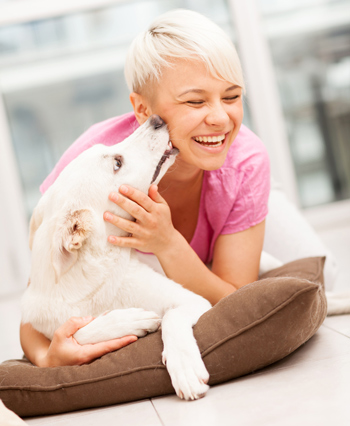Is It OK to Let Your Dog Lick Your Face?

Kissing is a common way for humans to show affection to one another. Some dogs love to give their humans kisses, too, but they do it in the form of licking.
If you have a dog that loves to give kisses, you may have wondered whether it's OK for your dog to lick your face.
Concerns with Dog Kisses
Dogs' mouths contain a huge host of organisms, including bacteria, viruses, parasites, and yeast, that humans don't have much immunity to. Some of them are zoonotic, which means that they can transfer from dogs to humans and cause illness in the humans. Some of these include Salmonella, e.coli, and campylobacter.
Not only are there lots of organisms inside your dog's mouth, but there are likely to be quite a few on your dog's face and muzzle because dogs are known for sticking their faces and noses into all sorts of places that might not be too clean.
Dogs use their mouths to explore the world, eat and drink, and clean themselves. So before you let your dog kiss your face, consider where his tongue might have last been.
When your dog licks your face, his saliva may get into the mucous membranes of your mouth, eyes, and nose, where they'll find it easy to enter your body. Your immune system is likely to fight the majority of these organisms off, but if you are immune compromised, already sick, young, or elderly, you may not be so lucky.
Should You Avoid Dog Kisses Entirely?
Now that you may be thoroughly grossed out about dog kisses, we'll tell you that you probably don't have to worry about a kiss given elsewhere on your body. If the skin where you receive the kiss is unbroken, organisms most likely won't be able to get into your body.
Special Concerns for Kids
It's especially important to do what you can to keep puppies and dogs from licking your child's face. Kids have immature immune systems that are less equipped to fight off microbes.
One big concern when it comes to kids is intestinal parasites that dogs, especially puppies, might be harboring. Eggs from these parasites are passed into the dog's stool. If the puppy gets stool into his mouth (which is quite likely for a puppy; he may eat his own stool or clean it off of his paws), those parasite eggs can be transferred to your child's mouth, where they are swallowed and can infect her.
These intestinal parasites can be quite serious in children. For instance, the most common intestinal parasite in puppies, roundworms, can even cause blindness in humans in some instances.
Not only is it important to teach your child not to allow a dog to lick her face, but she should be instructed to wash her hands whenever she's finished playing with a dog or after she plays outside, where she may come into contact with parasite eggs in the soil. Keep your dog's stool cleaned up outside, and be sure that you follow your veterinarian's de-worming and parasite prevention schedule for your dog.
Not All Dogs Like Kisses
Another important consideration when thinking about allowing dogs to kiss your face is that not all dogs are nice. If you are dealing with a dog you don't know well, don't offer your face for doggie kisses.
If You Still Want to Allow Dog Kisses
It's understandable if you still want to allow your dog to lick your face. In order to protect yourself as much as possible, follow these suggestions:
- Keep your dog's vaccinations, de-wormings, and parasite prevention up-to-date.
- Keep yourself healthy, and avoid dog kisses if you are immune compromised.
- Wash your hands and face with soap and warm water often.
- Keep your dog's mouth as healthy as possible with regular tooth-brushing at home and professional dental cleanings as recommended by your veterinarian.
- Closely monitor children with regards to dog kisses.
- Don't solicit face-licking from a dog you don't know.
You May Also Like These Articles:
Quiz - Test Your Cold Weather Dog Knowledge
A General Guide to Puppy Safety
How to Manage Your Dog's Over-The-Top Greetings
Things We Do That Annoy Our Dogs - Slideshow
Dog Adoption: What You Need to Know
Dog Training Tips: Using Treats Properly
Disclaimer: This website is not intended to replace professional consultation, diagnosis, or treatment by a licensed veterinarian. If you require any veterinary related advice, contact your veterinarian promptly. Information at DogHealth.com is exclusively of a general reference nature. Do not disregard veterinary advice or delay treatment as a result of accessing information at this site. Just Answer is an external service not affiliated with DogHealth.com.
Notice: Ask-a-Vet is an affiliated service for those who wish to speak with a veterinary professional about their pet's specific condition. Initially, a bot will ask questions to determine the general nature of your concern. Then, you will be transferred to a human. There is a charge for the service if you choose to connect to a veterinarian. Ask-a-Vet is not manned by the staff or owners of DogHealth.com, and the advice given should not delay or replace a visit to your veterinarian.



